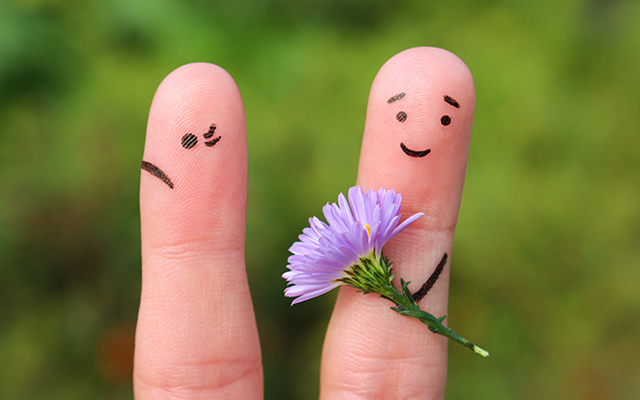Being generous with your apologies can be a good thing. A heartfelt apology is a way of showing respect and empathy to your loved ones. It can clear the air and strengthen a relationship.
But if you find yourself apologizing for every little thing, you might be unintentionally creating a rift between yourself and others — and internalizing increased guilt and stress.
Most of us are very familiar with overapologizing. If we don’t do it, we know someone who does. Social and health psychologist Juliana Breines, PhD, has said that the difference is when apologies “come too easily and too frequently, as when we apologize for things that are clearly not our fault, not in our control, or otherwise unworthy of apology.”
Overapologizing might sound like this: “I’m so sorry — I’m new at this.” “Sorry, I don’t mean to make you feel bad.” “Sorry to ask so many questions.” “Sorry, could you repeat that?” “Sorry, sorry — I’m so, so sorry!” Some people even apologize for apologizing so much.
The reasons behind this phenomenon are numerous and complex. “It may be a reflection of low self-esteem, a diminished sense of entitlement, an unconscious wish to avoid any possibility of criticism or disapproval before it even occurs, an excessive wish to placate and please, some underlying river of shame, or a desire to show off what a well-mannered Brownie Scout one is,” writes Harriet Lerner, PhD, in Why Won’t You Apologize? Healing Big Betrayals and Everyday Hurts. For some, saying “sorry” becomes so habitual it turns into a full-blown verbal tic.
It could also be a gendered problem. One study found that women are more likely than men to apologize, possibly because men “have a higher threshold for what constitutes offensive behavior.”
“More often than not, women who overapologize have a person in their life who has told them to stop apologizing. It’s usually either a boss or a mentor, or it’s a family member or friend who has already alerted them to this issue,” says Maja Jovanović, PhD, sociologist and author of Hey Ladies, Stop Apologizing . . . and Other Career Mistakes Women Make.
Still, it can be challenging to recognize when you’re saying “sorry” too often. That’s because it feels different for the person doing it than it does for people observing it. “When I ask, ‘How do you perceive other people who overapologize?,’ the top answers are ‘weak, insecure, incompetent, lacking confidence, easily manipulated, and not leadership material,’” says Jovanović, who is currently discussing apologies with women around the world for a study about women’s confidence and communication styles. “Then when I ask, ‘How do you think other people perceive you when you overapologize?’ the answer is they hope they’re perceived as ‘nice, polite, kind, thinking of others’ — but they acknowledge they’re probably perceived as lacking confidence and not being leadership material.”
“We are being perceived in the exact opposite ways to how we hoped we were,” says Jovanović, adding that there are work and career implications to this. “How likely is it that you want to take direction from somebody who overapologizes? Do you want that to be your team leader? Do you want that to be your boss? Is that going to be your new hire? No.”
But overapologizing isn’t just a self-defeating behavior pattern at the office — it also has the potential to become exhausting for everyone around you. It plants seeds of doubt and can undermine people’s confidence in you. It makes others feel uncomfortable. Close friends or partners may read your apologies as less meaningful because they’re so frequent. Some studies show that an unnecessary apology attached to a social rejection — “I’m sorry. I don’t want to go out with you again.” — actually increases hurt feelings.
Overapologizing can also take a psychological toll. It can be tempting, for example, to apologize when there’s a conflict and you want to ease the tension. “You want to do something because it’s uncomfortable for you,” says psychologist and anxiety expert Tamar Chansky, PhD, author of Freeing Yourself From Anxiety. “What’s unhealthy for the apologizer is that they are taking responsibility for the other person’s feelings.” And that, says Chansky, can lead to anxiety, diminished sense of self, and confusion about — or distortion of — how you deserve to be treated.
How to Stop Overapologizing
To keep yourself and your relationships as healthy as possible, you might consider limiting the number of “sorrys” you say in a day — and save your apologies for when you really want them to matter most. Here are some tips to try to curb the “sorry” habit:
- Notice how your apology feels. Paying attention to the sensations in your body can help you discern the difference between necessary and superfluous apologies. When Jovanović asked women how they feel after apologizing for mundane issues, they said they feel deflated, embarrassed, stupid, or silly. And when they offer a genuine apology? “They feel freer. They feel uplifted. They feel lighter — even if the apology may not lead to tensions being eased or the relationship being mended,” says Jovanović.
- Take a breath. If you find yourself tempted to say “sorry,” pause and ask yourself if you really, truly are. “We have to consciously stop apologizing for ourselves, and that takes practice,” says Jovanović, noting that sometimes silence is OK. “Even if you are mid-word you can walk it back.” If a “sorry” escapes that you don’t really mean, you can say: “Why did I say ‘sorry’? I shouldn’t have said ‘sorry.’” “That’s still a win because awareness has been brought in, and that’s the key,” she says.
- Turn it into gratitude. Many apologies can be replaced with thanks, which can help reframe the situation from guilt-inducing to gratitude-building. Instead of “Sorry I’m late,” for example, try, “I appreciate your patience! Instead of “Sorry I have to cancel,” you could say, “Thanks for understanding.”
- Commit to one new phrase. Jovanović has found that the most effective way to decrease overapologizing is to commit to one alternate phrase to use instead. One option is “Thank you.” You might consider “Excuse me,” “Pardon me,” or “I understand.” After you have solid experience using one rephrase, you can expand your repertoire.
- Say what you notice. You see that your friend is upset. You might be tempted to say: “I’m sorry. Are you OK?” Instead, Chansky recommends creating clearer boundaries around who holds the responsibility for the feelings by saying what you notice: “You seem kind of upset. I may be off here, but are you OK?”
- Avoid doing the thing you repeatedly have to apologize for: “Easier said than done, of course. But if you know you have a (preventable) bad habit that negatively affects other people, better to try to avoid doing it in the first place, or at least avoid repeating it, rather than just apologizing after the fact,” recommends psychologist Juliana Breines, PhD.
- Kick the minimizing habit: When you’re communicating an idea and say sorry — or use other minimizing qualifiers like just, kind of, sort of, actually, and Does that make sense? — it may be an attempt to appear polite and approachable. But using those words can lead to others having less confidence in your ideas, too, says Tami Reiss, product strategist and developer of Just Not Sorry. This popular Google Chrome plug-in alerts you when you use words or phrases in an email that undermine your message — which you can always ignore if you wish. “The app wasn’t designed to scream at you. Instead, it nudges you,” says Reiss, noting that it raises people’s consciousness and awareness about their language. Users find that it builds mindfulness not only in email, but in other written and verbal communication as well.
- Treat yourself with compassion: “You don’t have to apologize for having a bad hair day, for spilling on your shirt, or for needing three attempts to parallel park,” claims Breines. When you embrace your imperfections, you won’t feel the need to apologize for being human.





This Post Has 0 Comments